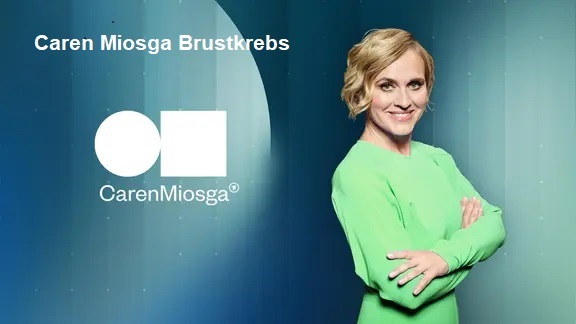Caren Miosga Brustkrebs: What’s True and What’s Just a Rumor

Introduction: Who Is Caren Miosga?
Caren Miosga Brustkrebs is one of Germany’s most respected television journalists and presenters. Known for her professionalism, intelligence, and calm demeanor, she has been a familiar face on German TV for many years. Her work as a host on programs like Tagesthemen and other ARD news formats has made her a trusted voice for millions of viewers across the country.
With such visibility, it’s no surprise that the public feels closely connected to her. Viewers often admire not only her journalistic integrity but also her warmth and authenticity. However, with fame also comes constant scrutiny — and sometimes, misinformation. In recent months, one particular rumor has circulated online: “Caren Miosga Brustkrebs,” meaning Caren Miosga breast cancer.
So, what is the truth behind this? Has Caren Miosga ever spoken publicly about having cancer? Or is it another case of speculation spiraling out of control on social media? Let’s look at the facts and understand how this story began.
The Origin of the “Caren Miosga Brustkrebs” Rumor
The phrase “Caren Miosga Brustkrebs” started trending in German-language searches and social media threads. People began to speculate whether the well-known journalist was dealing with a serious health issue like breast cancer. But when one actually looks for verified reports, interviews, or credible sources, something becomes clear: there is no confirmed evidence or official statement suggesting that Caren Miosga has breast cancer.
So where did the rumor come from?
In many cases, false claims about celebrities’ health start from vague comments, misinterpreted photos, or simple keyword confusion. For instance, a user might post a comment about “supporting women with breast cancer” on a thread featuring Caren Miosga — and soon, algorithms associate her name with the disease. Over time, more people see the phrase together, assume there’s a connection, and the rumor spreads.
This cycle happens frequently, especially with well-known women in media or entertainment. Because they appear regularly on television, any slight physical change — weight loss, hairstyle shift, fatigue — can be overanalyzed and misinterpreted as a sign of illness.
Caren Miosga’s Real Health Status

As of all reliable public information available, Caren Miosga Brustkrebs has not been diagnosed with breast cancer, nor has she ever made a public statement confirming any such illness. She continues to appear in excellent health on German television, working with the same dedication and professionalism as always.
Miosga has, however, supported health awareness causes in general throughout her career. Like many public figures, she has occasionally used her platform to highlight issues such as women’s health, equality, and public wellbeing. This may have further blurred lines for some viewers who confused her advocacy with a personal diagnosis.
Still, it’s crucial to note that supporting awareness and being a patient are very different things. There’s no evidence to suggest that Caren Miosga Brustkrebs herself has battled breast cancer.
The Psychology Behind Health Rumors About Celebrities
Why do such rumors emerge — and why do they spread so fast? It’s a phenomenon that psychologists and media researchers have studied for years.
1. Familiarity Creates False Intimacy
People who see a journalist or celebrity on TV daily start to feel they “know” them personally. When something seems different — perhaps they miss an episode, appear emotional, or look slightly tired — the audience fills in the blanks emotionally. They assume there must be a reason and often imagine health issues.
2. The Power of Emotional Keywords
Words like “breast cancer,” “stroke,” or “illness” immediately capture attention because they evoke empathy and fear. When attached to a celebrity’s name, they become clickbait — generating searches, social shares, and discussions, regardless of truth.
3. Lack of Clarification Fuels Speculation
Public figures rarely respond to every false rumor — and understandably so. Addressing baseless speculation can sometimes make it spread faster. But when silence meets curiosity, people mistake “no comment” for confirmation.
Caren Miosga Brustkrebs, known for her professionalism and private nature, has chosen not to comment on her personal life publicly. That choice, though absolutely her right, may have contributed to the persistence of these unfounded assumptions.
Why It’s Important to Protect Privacy and Truth
The rumor about “Caren Miosga Brustkrebs” is a good reminder of how fragile truth can be in the digital era. A few repeated keywords can turn into what seems like common knowledge. And when it involves something as personal and sensitive as health, the impact can be emotionally damaging.
Public figures, especially women, face additional scrutiny regarding their appearance and wellbeing. Any small change becomes a talking point. This type of attention can be invasive, even when it begins from a place of concern.
Respecting privacy isn’t just about politeness — it’s about fairness. Everyone, regardless of their fame, deserves control over how and when their personal health information is shared.
Understanding Breast Cancer Awareness vs. False Attribution
It’s possible that this rumor gained traction during Breast Cancer Awareness Month, when many celebrities, journalists, and public figures show support for campaigns, wear pink ribbons, or participate in awareness programs. Caren Miosga Brustkrebs may have been associated with such efforts — and in turn, people mistakenly assumed she was personally affected by the disease.
Breast cancer awareness campaigns encourage women to get regular screenings and prioritize early detection. The cause is noble, and it’s natural that famous personalities would use their platforms to amplify it. But again, participating in or supporting a cause does not mean someone is suffering from it personally.
Lessons from the “Caren Miosga Brustkrebs” Story
This situation highlights the importance of critical thinking when consuming celebrity news or social media posts. Here are a few reminders worth keeping in mind:
- Always check official sources.
If there’s no official statement, confirmed report, or credible media coverage, treat the information as unverified. - Be mindful of how rumors start.
Sometimes, even innocent discussions or awareness posts can be twisted into misleading narratives. - Separate advocacy from experience.
Just because someone speaks about a health issue doesn’t mean they’ve experienced it personally. - Think before sharing.
A simple share or comment can unintentionally amplify a false story — even when your intention is to show support.
Caren Miosga’s Strength and Professionalism
What makes Caren Miosga Brustkrebs stand out as a journalist is her poise, clarity, and commitment to truth — qualities that make her one of Germany’s most respected presenters. Despite living under public scrutiny, she has managed to keep her personal life private, focusing instead on delivering accurate and balanced reporting.
Her ability to stay calm under pressure, maintain objectivity, and treat sensitive topics with respect is exactly what makes her trusted by millions. And that same sense of integrity should extend to how we discuss her as well — with fairness, respect, and truthfulness.
Conclusion: No Evidence of Breast Cancer
After examining all the available facts, one thing is clear: there is no verified information that Caren Miosga has breast cancer. The phrase “Caren Miosga Brustkrebs” appears to be the result of online speculation, confusion, or keyword misinterpretation.
Caren Miosga Brustkrebs continues to thrive in her career, serving as one of Germany’s leading journalists and respected television personalities. Instead of focusing on unfounded health rumors, her story should be celebrated as that of a woman who has balanced professionalism, intelligence, and dignity in a demanding industry.
In an era of misinformation, this story serves as a valuable reminder — always verify before believing, and treat public figures with the empathy and respect they deserve.
You May Also Read
Dagmar Manzel Sohn Todesursache



